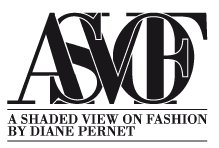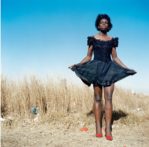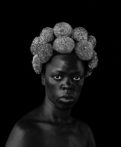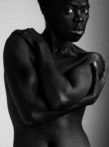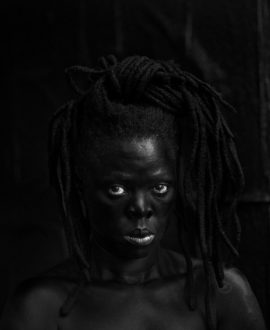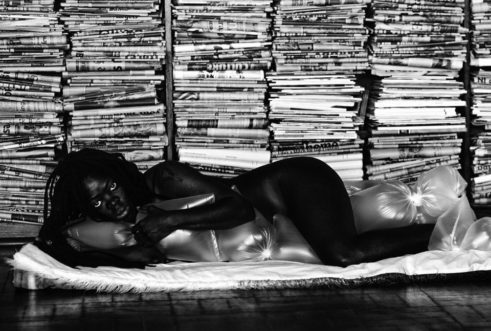Dear Shaded Viewers,
Zanele Muholi is a visual activist that is having his first retrospective presentation in France at MEP with the support of Tate Modern in London.
Zanele Muholi is that most unique of figures in the international contemporary art world: a powerful and original voice that transcends the boundaries of their own immediate interests and local sphere. Associated primarily with work over many years in the LGBTQIA+ and gender-nonconforming communities in South Africa, Muholi’s work has implications for questions of identity and political activism in the worlds of photography and art that reach, and echo, far beyond their origins and context. A primary and essential aspect of Muholi’s practice is how images associated with the visual arts might not only respond to pressing and urgent social questions (in other words, a question of documentation, the means of bringing a subject to the public), but how they might effect change in the world beyond that in which they were made. Since training at the Market Photo Workshop in Johannesburg, Muholi has never settled for an understanding of photography (or indeed video) associated
with the limited conventions of traditional documentary practices. Their work takes on the narrow concept of representing the realities of their subjects and reaches beyond, forcing us to think about, and often rethink, the ways in which representation itself might fall short for some communities and identities. Their practice in portraiture, portraits of both themself and others, offer ample evidence of both the ambition and efficacy of an approach which seeks, we could say, never to leave the possibility for an audience to be unaffected or unmoved by an encounter with it.
As ever, in conjunction with our major exhibition in the principal galleries,
the MEP invites two exciting early-career artists to exhibit in The Studio, which, from 2023, is programmed by Clothilde Morette for the MEP with the continued generous support of Christian Dior Parfums. The first Studio is
that of Cedrine Scheidig, laureate of the prix Dior for photography in 2021, who brings her own unique take on questions of race and identity in both her native Paris, and in new works made in Martinique. The second Studio of
the season marks the first solo exhibition in France of acclaimed American artist and filmmaker Diane Severin Nguyen, whose photographic work evokes questions of both material and categorical instability.
The MEP is proud to bring together three artists working at the cutting
edges of today’s image world for the start of a year of programming that will showcase the works of historic and contemporary women artists including Jay DeFeo, Maya Rochat and Viviane Sassen.
Simon Baker Director of the MEP
Zanele Muholi, who defines themself* as a “visual activist”, uses the camera as a tool to confront and repair injustice. During the 1990s, South Africa underwent significant social and political change. Democracy was established in 1994 with the abolition of apartheid; this was followed by a new constitution in 1996, the first in the world to outlaw discrimination based on sexual orientation. Despite this progress, today the Black LGBTQIA+ community still remains the target of violence and prejudice.
Muholi is deeply involved in this community, and their photographic work is inseparable from their life and their activism. Telling stories that are both individual and collective, the artist hopes to give them visibility while challenging stereotypes and conventional representations. Bringing to light the uniqueness and diversity of the individuals they picture, Muholi emphasizes their courage and dignity in the face of intolerance and discrimination.
Muholi’s work is created through a collaborative process. They refer to
the people they photograph as active “participants” in the work rather than “subjects”; the portrait’s setting, clothing and pose are determined together. At times, the artist also turns the camera lens on themself, calling into question the image of Black women in history.
These photographs encourage viewers to address their own misconceptions. Together they create a new lexicon of positive imagery for under- and misrepresented communities, promoting mutual understanding and respect.
“The images we see rely on binaries that were long prescribed for us (heterosexual/ homosexual, male/ female, African/unAfrican). From birth on, we are taught to internalise their existences, sometimes forgetting that if bodies are connected, connecting, the sensuousness goes beyond simplistic understandings of gender and sexuality.”
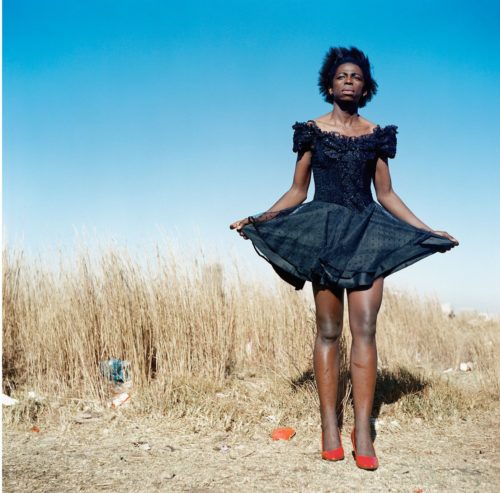
Queering Public Space (2006 – 2020)
Photographing Black LGBTQIA+ participants in public spaces is an important part of Zanele Muholi’s visual activism. “We’re ‘queering’ the space in order to access the space. We transition within the space in order to make sure that Black trans bodies are part of this as well. We owe it to ourselves,” says the artist.
Several of the locations seen in these images are important to the history of South Africa, including historic urban spaces, working-class neighbourhoods and beachfronts such as Durban Beach, located near Muholi’s birthplace of Umlazi. Beaches were segregated during apartheid and are therefore potent symbols of how racial segregation affected every aspect of life. Some images were taken at Constitutional Hill, the seat of the Constitutional Court of South Africa, a symbol of the country’s progression towards democracy.
Muholi often chose here to photograph in vibrant colour, bringing the work closer to reality and rooting it in the present day.
